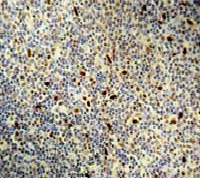Ki67 (MKI67) Rabbit Polyclonal Antibody
Other products for "MKI67"
Specifications
| Product Data | |
| Applications | IHC |
| Recommended Dilution | Immunohistochemsistry on Frozen and Formalin-Fixed Paraffin Embedded Sections: Use a dilution of 1/25-1/50 in an ABC method (30 minutes at room temperature). Formalin fixed paraffin embedded tissue sections require high temperature antigen unmasking with 10 mM citrate buffer, pH 6.0 prior to immunostaining. Recommended Positive Control: Tonsil. |
| Reactivities | Human |
| Host | Rabbit |
| Clonality | Polyclonal |
| Immunogen | Synthetic peptide from 62 base pair region of the Human Ki-67 antigen. |
| Specificity | This antibody reacts with a nuclear antigen present in proliferating human cells. It can be used to evaluate the ki-67 labeling index in various tumors. Cellular Localization: Nuclear. |
| Formulation | State: Purified State: Liquid purified Ig fraction Preservative: < 0.1% Sodium Azide |
| Conjugation | Unconjugated |
| Storage | Store undiluted at 2-8°C for one month or (in aliquots) at -20°C for longer. Avoid repeated freezing and thawing. |
| Stability | Shelf life: one year from despatch. |
| Gene Name | marker of proliferation Ki-67 |
| Database Link | |
| Background | Ki-67 antigen is expressed in proliferating cells but not in quiescent cells. Expression of this antigen occurs preferentially during late G1, S, G2, and M phases of the cell cycle, while in cells in G0 phase the antigen cannot be detected. Consequently, Ki-67 antigen expression is used in tumor pathology to detect proliferating cells in neoplastic diseases. In cultured cells, Ki-67 is expressed in the nucleolus of interphase cells. The Ki-67 gene contains 15 exons. The Ki-67 repeat region, within which there is a 22-amino acid Ki-67 motif, is encoded by exon 13. The shorter isoform lacks exon 7. Northern blot analysis re-vealed multiple transcripts ranging from approximately 8.9 to 12.5 kb in proliferating but not quies-cent cells. Immunoblot analysis showed expression of 320- and 359-kD proteins. Sequence analy-sis predicted that the short-lived 2,896- and 3,256-amino acid protein isoforms contain potential nuclear targeting signals, over 200 potential phosphorylation sites, 19 N-myristoylation sites, 3 amidation sites, and numerous PEST sites. Antisense oligonucleotides inhibited cellular prolifera-tion in a dose-dependent manner, suggesting that Ki-67 protein expression may be an absolute requirement for cell proliferation. |
| Synonyms | Ki67 antigen, MKI67, Proliferation marker |
| Reference Data | |
Documents
| Product Manuals |
| FAQs |
| SDS |
{0} Product Review(s)
0 Product Review(s)
Submit review
Be the first one to submit a review
Product Citations
*Delivery time may vary from web posted schedule. Occasional delays may occur due to unforeseen
complexities in the preparation of your product. International customers may expect an additional 1-2 weeks
in shipping.






























































































































































































































































 Germany
Germany
 Japan
Japan
 United Kingdom
United Kingdom
 China
China



